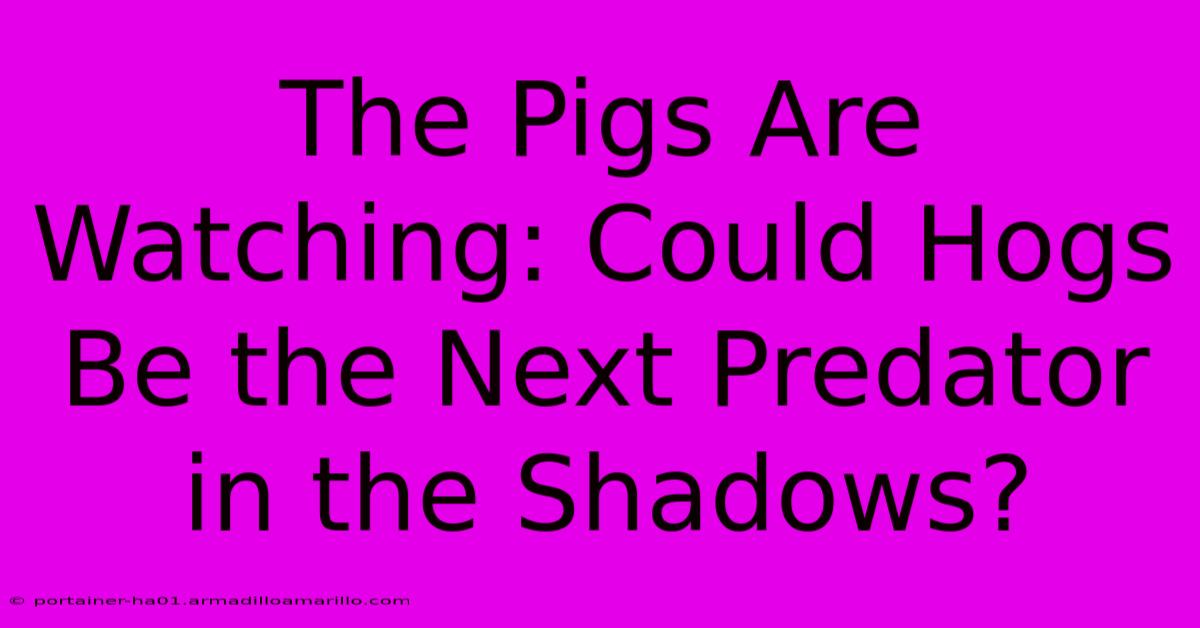The Pigs Are Watching: Could Hogs Be The Next Predator In The Shadows?

Table of Contents
The Pigs Are Watching: Could Hogs Be the Next Predator in the Shadows?
The image of a pig is typically associated with gentleness, even clumsiness. But a growing body of evidence suggests that these seemingly docile creatures might be developing a darker side. While not exactly lurking in the shadows like a panther, feral pigs are exhibiting increasingly predatory behaviors, raising concerns about their impact on ecosystems and potentially, even human safety. Are pigs becoming the next unexpected predator? Let's delve into the unsettling truth.
The Rise of the Feral Pig
The key to understanding this potential shift lies in the dramatic increase in feral pig populations worldwide. These animals, often descendants of escaped domestic pigs, thrive in diverse environments, exhibiting remarkable adaptability and reproductive rates. Unfettered by natural predators in many areas, their numbers have exploded, leading to increased competition for resources and, consequently, a change in behavior.
Competition Breeds Aggression
With more pigs vying for the same food sources, competition intensifies. This leads to a fascinating evolutionary pressure. Pigs, historically omnivores with a preference for rooting around for vegetation, are starting to display a more active hunting style. This isn't just about scavenging; reports of feral pigs actively pursuing and killing smaller animals are becoming more frequent.
A Growing Body of Evidence
Studies across various regions are documenting these changes in feral pig behavior. Researchers have observed:
- Prey Selection: Feral pigs are targeting a wider range of prey, including birds' nests, reptiles, amphibians, and even small mammals. Their opportunistic nature allows them to exploit readily available food sources, regardless of whether they're traditionally "pig food."
- Hunting Tactics: Although not sophisticated predators, their sheer size and strength allow them to overwhelm smaller creatures. They're known to use their snouts and tusks effectively to capture and kill prey.
- Impact on Native Species: This shift in diet is having a considerable impact on native wildlife populations. Feral pigs can decimate ground-nesting bird populations, reduce amphibian numbers, and disrupt delicate ecosystems.
The Threat to Humans?
While the immediate threat to humans from feral pigs is relatively low, there are still concerns:
- Disease Transmission: Feral pigs can carry various diseases that can be transmitted to humans, livestock, and other animals.
- Agricultural Damage: Their rooting behavior causes significant damage to crops and pastures, impacting farming communities and livelihoods.
- Potential for Escalation: As feral pig populations continue to grow and their hunting behaviors become more ingrained, the potential for increased conflict with humans—though currently rare—cannot be dismissed entirely.
What Can Be Done?
Addressing the growing issue of feral pig predation requires a multifaceted approach:
- Population Control: Implementing effective population control measures, including hunting, trapping, and sterilization programs, is crucial.
- Habitat Management: Managing habitats to reduce the availability of resources for feral pigs can help limit their spread.
- Public Awareness: Educating the public about the potential dangers and ecological impact of feral pigs is essential to promoting responsible management strategies.
Conclusion: A Shifting Landscape
The image of the docile pig may be undergoing a significant revision. While not poised to become apex predators, feral pigs' increasingly predatory behaviors are a significant cause for concern. Understanding this shift and implementing proactive management strategies are vital to protecting both ecosystems and human interests. The pigs are watching, and we need to pay attention.

Thank you for visiting our website wich cover about The Pigs Are Watching: Could Hogs Be The Next Predator In The Shadows?. We hope the information provided has been useful to you. Feel free to contact us if you have any questions or need further assistance. See you next time and dont miss to bookmark.
Featured Posts
-
Unicorn Rainbow Nation Unleash The Magic Of Oregons Cheer Signs For Lgbtq Pride Unicorn
Feb 07, 2025
-
Chicharito And The Beast The Most Outlandish Nicknames In Football
Feb 07, 2025
-
Natures Architect Sakuras Branching Patterns Revealed
Feb 07, 2025
-
Thread Or Seeds Sewed Vs Sowed The Crucial Distinction
Feb 07, 2025
-
Beyond The Picture The Story Behind Black And White Photo Spot Lighting
Feb 07, 2025
